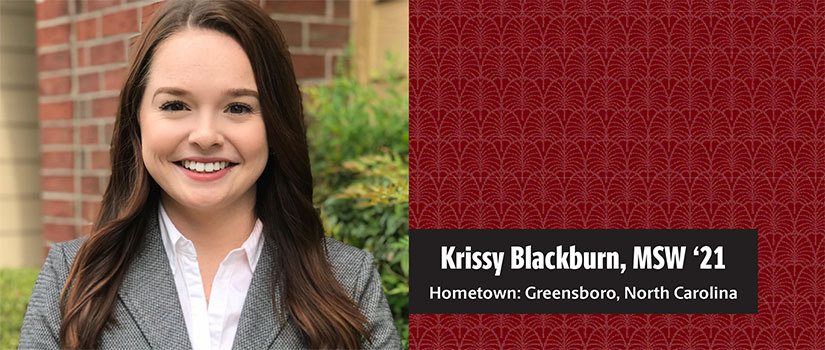Nov. 12, 2020
Chris Woodley • cwoodley@mailbox.sc.edu
According to the U.S. Bureau of Labor Statistics, the employment of mental health counselors is projected to grow by 25% from now to 2029. As mental health continues to be destigmatized and more people are comfortable seeking treatment, the College of Social Work is already providing MSW student Krissy Blackburn with a head start on her future career.
Blackburn’s interest in counseling began during her undergraduate studies at the University of North Carolina at Charlotte. She sought the services of the school’s counseling center after feelings of losing a sense of who she was and whether she wanted to attend graduate school.
“I had a positive experience working with my therapist and learning coping skills for my anxiety, self-identity as a young adult, and figuring out what I wanted to do with my life,” Blackburn says. “It was one of the most beneficial and positive times in my life. I'm glad I went through those hardships of questioning who I was because I don't know where I would be without the counseling services.”
Being on the receiving end of therapy was what Blackburn needed at the time. But it also inspired her to pursue social work graduate studies.
“I chose social work because I didn't want to go through life just sitting behind a desk and having a routine,” Blackburn says. “I want to leave a positive mark on this world and make sure I dedicate every day to changing someone’s life and help change the world in a small way.”
Blackburn started at the College of Social Work in 2019 and since then, the field education component has provided her with the opportunity to put her passion for counseling into action. During her placement last year at Domestic Abuse Center, she listened and worked with perpetrators of domestic abuse. After interacting with survivors of domestic abuse during undergrad, she wanted to experience the mental health aspects of the perpetrators.
“It was one of the most eye-opening experiences because our society stereotypes and automatically dehumanizes perpetrators,” Blackburn says. “We help them recognize past trauma and how that influenced their behaviors in relationships. Instead of giving up on them, we teach skills to turn their life around and learn from their mistakes.”
Blackburn is interning this year at Three Rivers Midlands residential facility and has led individual sessions and groups with youth. While she never considered working with youth, she challenged herself by working with a different population.
“They have endured so much trauma at a young age, and I have no words for what they have experienced, “Blackburn says. “It's been interesting to hear the stories and see how trauma is portrayed in their everyday lives through actions and mannerisms and how I respond to them as a student trying to figure out my identity as a therapist.”
According to the National Institute of Mental Health, one in five adults in the U.S. lives with a mental illness, yet more than half of those individuals do not seek treatment. People of all ages may hide their struggles from family members and are scared to seek services. Blackburn grew up in a household where her mom was open about her anxiety and depression, and she encourages others to learn more about their mental illness and seek services to prevent it from becoming debilitating.
“While I will be forever grateful that I never had to hide anything and always had someone to talk to, it's disheartening to hear people who remain quiet because they grew up in communities that didn't talk or were told they were overreacting,” Blackburn says. “We live in a society where people are quick to undermine what others are enduring. The ‘pull yourself up by your bootstraps’ mentality of self-reliance does not work today when it comes to mental health.”
Blackburn also has an extensive list of volunteering, including serving as a rape crisis companion at Safe Alliance in Charlotte and a summer counselor at the North Carolina Coalition against Sexual Assault. In addition to the enjoyment of helping others, the experiences have also taught her important lessons.
“I attribute my parents for encouraging me to volunteer and being involved in my community,” Blackburn says. “Working with different communities forced me outside my comfort zone and opened my eyes to everything happening in the world.”
Blackburn’s personal and volunteer experiences, internships and social work courses have influenced her as she prepares to embark on a counseling career after graduating this coming May. Perhaps the biggest lesson she has learned is to take the time to sit down and learn about someone’s story instead of assuming how they ended up in their current situation.
“Everyone has their own journey, and you can help them regardless of past events,” Blackburn says. “Since everyone has a story and a reason for their current situation, it's not our place to judge or disassociate ourselves from others because of their standing in life. We're all human at the end of the day.”
